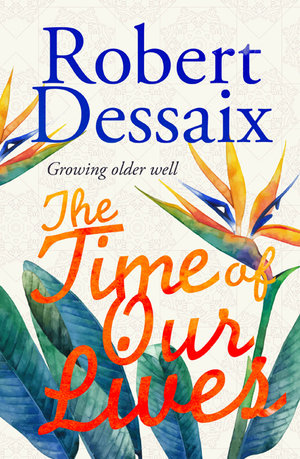 The Time of Our Lives
The Time of Our Lives
by Robert Dessaix (Brio Books)
Audio book narrated by Paul English (Wavesound)
Robert Dessaix is at a Yogyakarta hotel when he starts contemplating growing old. At 76 years of age, he is watching a 25 year-old Balinese wellness instructor on the lawn with a group of elderly hotel guests as they prance and swivel to music. “Apparently there is nothing like energetic dance movements to boost the cognitive functions” but he knows his limits and is not tempted to join in.
Like those who follow Jane Fonda’s instructions for staying forever young, he sees the guests as desperately trying to battle the last enemy and postpone what they fear most – death. As he sits in the garden he finds the energetic calisthenics unsettling, seeing exercise as just another self-deluding strategy alongside punishing diets, hormone treatments and anti-aging serums.
Walking around Java’s Borobudur Temple and hearing the regular call to prayer, Dessaix’s contemplations wander to religion. Although he has lost confidence in religious dogma, he sees it as a perfect symbolic system that outperforms all other systems for combating death. Faith doesn’t require rational reasons to flourish and “everlasting life” seems better than “post-modern nothingness”.
Visiting his partner Paul’s mother Rita, who is “little more than a skeleton with papery skin stretched over it” in a place that reeks of boredom, he is forced to confront end-of-life challenges. As Bette Davis famously said – old age is certainly no place for sissies and Dessaix sees that he is at an age where years don’t just fly by but hurtle by.
The book is a marvellously eclectic ramble as he converses with friends and dips into his well-read knowledge for the key to the art of growing older well. These enjoyable tangents eventually bring Dessaix to the realisation that a healthy inner life is something to hold onto as his body falls apart. I love that when he ruminates about all things nice, the call of an early night in bed with a good book is more and more irresistible.
I was also intrigued by his discussion on the differences between happiness and contentment and the concept of yutori. Yutori is the latest mindfulness from Japan that translates as ‘not being cramped’. No mat or meditation needed as you find the time and space – and even the resources – to do whatever it is you’d like to do. Sounds like a plan!
Lezly Herbert

Love OUTinPerth Campaign
Help support the publication of OUTinPerth by contributing to our
GoFundMe campaign.





